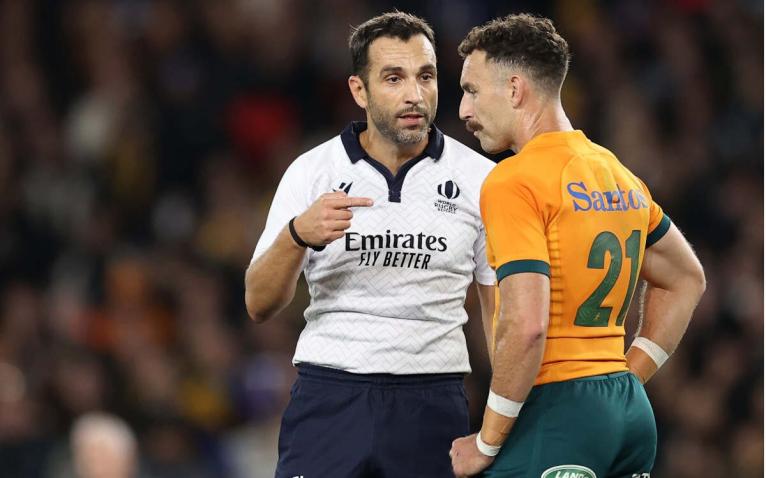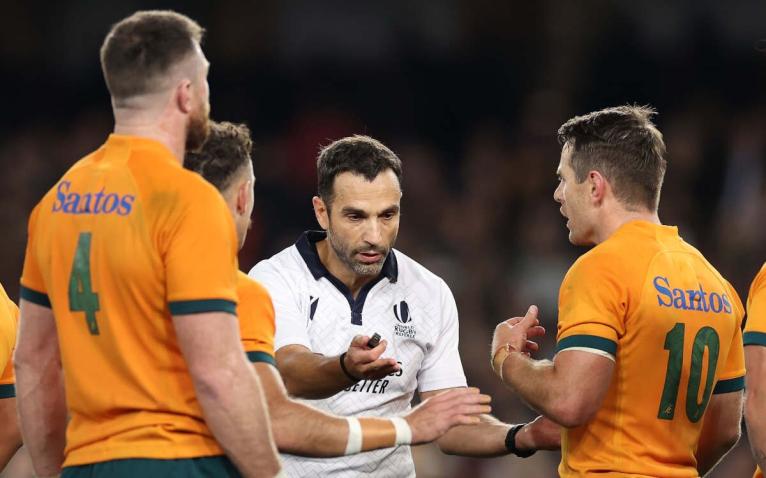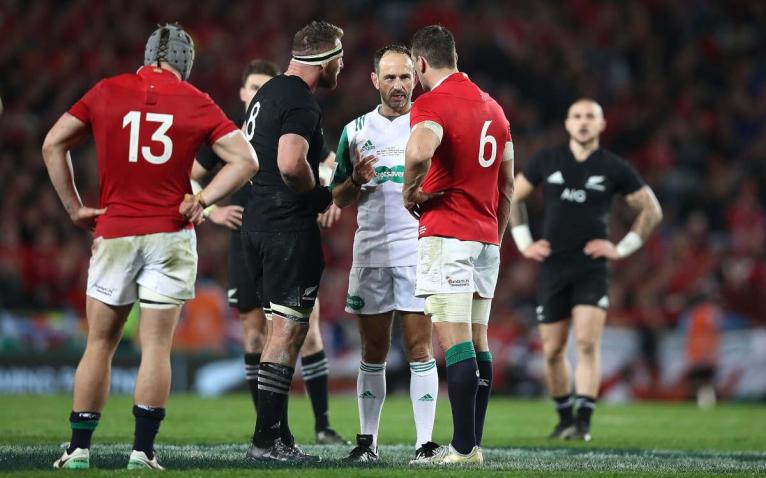Was it ‘robbery’ or was it simply ‘ridiculous’? Australia seems to be almost evenly split. In the immediate aftermath, Tim Horan said it was ‘a disgraceful decision’ from a referee who ‘cracked under pressure’. Morgan Turinui thought the official should be sanctioned – ‘you don’t contrive a situation to cost the better team the game’ – while Matt Giteau tweeted; ‘that’s the worst call I’ve ever seen’. Ironically, when it came to piling in on Mathieu Raynal, Australia wasted no time whatsoever.
If you missed the moment – or the fallout – from last week’s barnstorming Bledisloe Cup game in Melbourne, where on earth have you been? Seventy-eight minutes in, Australia up by three, New Zealand penalised five metres short of the Wallaby line but then awarded a scrum after referee Raynal decided Australia were time-wasting on their kick to touch, a position from which the wily Will Jordan fashioned a last-gasp, game-winning try for Jordie Barrett. High drama or French farce? Opinion hasn’t been this divided since the invention of black and white.
Look, it’s hard to argue that Raynal didn’t make himself crystal clear on the penalty kick to touch. He asked both captain, Nic White, and fly-half, Bernard Foley, to get on with it, then asked them again, then stopped the clock to reinforce the point, then restarted the clock, then nudged Foley again and then finally lost patience, not surprisingly given 47 seconds had passed since the penalty had been awarded. If you’d like a spoonful of context here, Karsten Warholm could’ve run a 400 metres hurdles in that time with a second to spare.
Technically, Raynal was spot on. What constitutes delaying the game is at the referee’s discretion and this referee clearly felt, understandably given he was talking to a brick wall, that Australia were running down the clock. Foley said afterwards he thought time was still off, odd given Raynal was a metre away from him when he said ‘Time On’ and blew his whistle. Tough to make that one wash.
In a green and gold broadside in The Sydney Morning Herald, Iain Payten said the incident highlighted a thorny problem with refereeing; in his words, ‘it should not be just a question of can I blow my whistle but should I blow it’? It other words, materialism; yes, I’ve just cause to intervene but is it material to what’s going on? And Payten’s absolutely right. It’s one of the thorniest areas of refereeing.

But if Raynal deems time’s being wilfully wasted, that’s material to the game, a question of both ‘can’ and ‘should’. Put it this way, how long is he supposed to wait for a team to comply with four, perfectly plain instructions? Folk have homes to go to and, on Thursdays, Melbourne’s trams shut down at midnight.
Australia Head Coach, Dave Rennie, also played the empathy card. ‘I think you’ve got to have a feel for the game, a feel for the game and the situation’ he said. ‘So if you feel a team’s wasting time, then stop the clock, then they kick it out and then you play the game and the teams decide it.’ All of which sounds reasonable enough, except that the ball can’t be in play – in this case, kicked into touch – when time’s off.
Part of your game management is to listen to the referee. So when the referee says ‘time on’, you have to play it. I just saw it out there. I heard very clearly what the ref said.
Ian Foster, All Blacks head coach
Rennie also said he hadn’t ‘seen a decision like that any level’ and if that’s what he says, I believe him. He’s one of rugby’s good buggers. But we’ve seen numerous examples of teams being pinged for time-wasting at rucks, scrums and line-outs, even the odd conversion and penalty shot at the poles. It doesn’t happen every day because, generally, players are smart enough to listen to what the referee’s asking for. In this instance, Australia weren’t.
Which is, essentially, the nuts of the thing. If you talk to coaches about discipline, the one thing that waters their eyeballs is players giving away penalties and possession simply because they were ignoring what the official was telling them; ‘shitty’ stuff, as one once described it. New Zealand Coach Ian Foster, rightly, summed it up. ‘Part of your game management is to listen to the referee’ he said afterwards, ‘So when the referee says ‘time on’, you have to play it. I just saw it out there. I heard very clearly what the ref said.’
Essentially, this is the traffic warden argument, isn’t it? If I pull up on a double-yellow line and a meter-maid tells me I need to move my motor pronto and I ignore her – then ignore her again, and again and then again – then I can’t exactly grumble if I end up with a ticket clamped under the wiper. That’s on me, isn’t it?

Was Raynal consistent on time-wasting throughout the game? Again, it’s tough to argue he wasn’t. The statistics suggest that, on penalty kicks to touch, New Zealand had five during the match (taking 20”/14”/20”/15”/13”) and Australia eight (25”/18”/22”/30”/ 35” – given a hurry-up warning – 18”/22”/47”). In other words, Australia took virtually three times longer over their last kick as New Zealand took on average (16”), not forgetting the warning over the 35” delay. It was hardly a left-field call.
You can have sympathy here for Australia’s angst. Against all odds, they’d put themselves in position to drag The Tin back over The Ditch for the first time in 20 years. But the giveaway was the Wallaby backs lined up outside Foley, who in the five seconds prior to Raynal’s intervention were waving their arms and screaming at him to kick it out and in the five seconds after were spitting tin- tacks all over the turf. They knew. So how was it Foley didn’t?
If Nic White’s almost petulant – ‘Mate, that just cost us the Rugby Championship’ – was an example of how the Wallabies had been conducting themselves throughout the game, then it’s hardly surprising that they weren’t making any friends
Cajoled by social media, Nigel Owens felt it was ‘a fair and strong refereeing call by Raynal’, a referee, it’s worth noting, with a decade’s experience at Test level. No question, it was nutsy. So too was tracking down Nic White on the pitch after the final whistle and offering his commiserations, only for White to respond: ‘Mate, that just cost us the Rugby Championship’. Raynal was having none of it. ‘That’s not fair what you did,’ he said, the hand on the shoulder suddenly a frank forefinger in White’s chest. ‘You just run the time and you know exactly. If you think I am not capable to give a scrum and turn over ball, you make a mistake.’
Australia said afterwards they’d be sending ‘World Rugby’ a ‘please explain’ memo, possibly in capital letters. The reply shouldn’t take too long to draft. Perhaps the Wallabies would be better served asking a few questions of themselves; not why were we ‘robbed’ by Raynal but how did we end up with three players in the sin-bin during which time New Zealand scored 21 points?
Or, indeed, addressing their management of the referee. If Nic White’s almost petulant – ‘Mate, that just cost us the Rugby Championship’ – was an example of how the Wallabies had been conducting themselves throughout the game, then it’s hardly surprising that they weren’t making any friends. Raynal’s riposte certainly suggested his patience was exhausted and, certainly, if you niggle the referee to that extent, you’re playing with fire.

It’s a crucial aspect of the modern game. Warren Gatland was once asked why he wanted Sam Warburton as his Lions’ captain. ‘Because he’s brilliant at handing referees’ said Gatland, a point emphatically proved when Warburton’s intervention in the last inches of the 15-15 draw in the Third Test in New Zealand prompted Romain Poite to downgrade a potential game-winning All Black penalty for offside to a scrum for accidental offside. Effectively, Warburton’s silver tongue turned a losing series into a drawn series and, predictably, Poite was pilloried across New Zealand.
And here we are again; an honest, vastly experienced, top-flight referee getting the flamethrower treatment for – excuse me – getting it right. Referees getting burned when they make genuine mistakes is tough enough to stomach but getting torched when they’re bang on point is intolerable, the more so in a sport which, at its grassroots, is woefully struggling to find willing officials. Whether he’s right or he’s wrong, the referee is always right. If you don’t accept that premise, then best find something else to do with your weekend.



I'm not sure the Romain Poite call was an example of a referee 'getting it right'. By his own admission Poite realized he'd made a big mistake. Warburton's intervention was beautifully weighted and may have tipped Poite over the line and yes a great example of referee management. Nic White's petulant comment after the game said it all...but then really what else did we expect from a man who collapses in agony after a caress across the face.
However it is a shame there is so much debate about this and not the focus on what was an outstanding test match. The quality of the rugby was sublime in a packed Marvel stadium. I've read some of the comments below how the other codes are superior. But at international level in Australia there is really no contest as Rugby Union is the only winter code where Australia are competitive and other countries actually play it.
Instead of whinging about a strong call from the ref they should be drawing on the positives they displayed in the game they all but won, learn to manage their relationship with the ref and take the learnings to Eden Park where a chance to overturn a 38 year hoodoo awaits.
If the penalty is given as a start to all time wasting I’m happy to wear this. The fact he had options to call time off, set the expectation tell Foley to kick immediately (the noise in a roof closed Marvel Stadium with 55k spectators is also not getting enough air time).
But will we see sanction against Plodding NH T5 forwards? Nope? Caterpillar rucks taking an age to be formed only for the 9 to take another 15 secs to punt the ball. Nope?
And this is the point Aussies don’t have a problem with the call. It’s just the first awarding of it is on our line against the ABs when we’ve got ourselves in a position to win the match.
And here’s the broader context. The game is unhealthy. The officIating is dire, globally, and it’s inconsistent at best. Australia is a bell weather for footballing codes. The local game, AFL just signed a $4.5b TV rights deal. Rugby League Will re negotiate similar terms shortly. They innovate and keep the officiating (generally) consistent and in line with an entertainment vs game ratio which provides pretty amazing outcomes. World Rugby seem to think there’s no problem here with the 14000 rules in Rugby which destroy any flow of a match.
We currently have a French Bloke making it up on the spot because he felt like nobody was listening to him. Making this all about him. It’s rubbish.
Spot on.
Can we please move on?
Australia, led by Chairman of the Board are underperforming whingers.
Want more money for poor product and let's not forget, the highlight of Aust rugby on TV is club competition. No wonder NRL, AFL and Soccer are thriving here.
Want wins awarded when they are inferior in skill, reading the game and tactics.
Of all serious international teams, Australia has the poorest head coach.
Someone who thinks, as Ivan Vodanovich did in 1970, flogging out players in between matches is the best preparation.
Someone who puts Nic White, [this clown should be on a charge for bringing the game into disrepute at Adelaide], into an onfield leadership role.
Someone who got away with gamesmanship when he won with Chiefs several years ago and now thinks it acceptable to introduce the "smart" tactics to Test matches.
Australia is most fortunate to still have the use of Korobeite after the questionable try saving tackle in Adelaide.
Pink sums up Rugby Australia perfectly:
"This used to be a fun house now it's full of evil clowns', it's time to bring the house down...."
Over to you grass roots rugby, but please do not continue to demean yourselves by writing letters of complaint to the Headmaster, especially when you know the Headmaster is not good at dealing with anything.